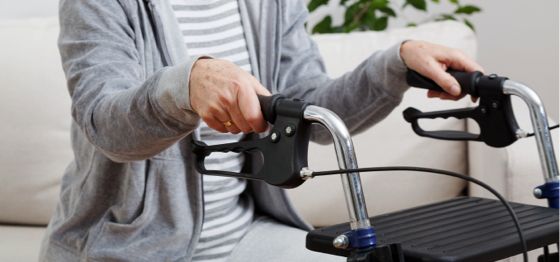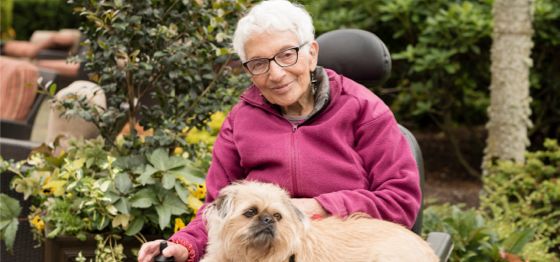More than 12 million older Americans currently live alone. Of that number, 61 percent say they prefer to age at home with a caregiver, while only 17 percent would prefer moving to an assisted living facility. Just 8 percent want to move in with family and only 4 percent would opt for a nursing home.1 But even though those millions of seniors don’t want or need 24-hour skilled nursing facility services or the services of a visiting nurse, they could benefit from assistance with various aspects of their lives at home, which, in turn, can contribute to their physical well-being and mental health.2 And that’s where a senior companion comes in.
What is senior companion care?
Senior companions are people who provide care to older adults by engaging them in physical, mental or social activities, while also monitoring their safety inside and outside the home. A companion may assist with everyday activities like bathing and dressing. For the most part, however, the companion keeps the older adult company and makes sure they stay safe. A companion’s specific duties depend on the preferences of the older adult or of the senior’s family, but often include:3
- Offering friendship and conversation
- Assisting with technology such as computers, internet connections, mobile phones or smart TVs
- Preparing meals and serving snacks
- Doing light housework
- Running in-town errands
- Driving to and from doctor appointments
- Going on walks or assisting with exercise
There are two types of senior companion care: in-home and live-in. Here’s how they compare:4
- In-home companion care for the elderly
For this type of care, the companion comes to the home on a set schedule. If other people are living in the home, the companion’s daily duties only pertain to the older adult receiving care. Companions are not responsible for performing chores or activities for others.
- Live-in senior companion care
When an older adult has dementia or a chronic condition that causes sudden medical emergencies, a live-in companion is in order. This person performs the same duties as an in-home companion but is also available at night to help with trips to the bathroom or to redirect a confused senior who wanders.
Differences between senior companions, home health aides and home health nurses5
Home health aides offer protection and fellowship just like a senior companion, but they usually spend more time helping the older adult with the activities of daily living (ADLs).
ADLs include restroom, bathing and feeding assistance. Some home health aides also administer medication and provide medication reminders. Home health aide training and certification requirements vary on a state-by-state basis.
In addition to carrying out the duties of a home health aide, the home health nurse is a licensed professional who provides medical treatment, such as wound care, injections and administers intravenous (IV) medications.
Benefits of senior companion services
Having a companion can mean that the older adult continues to take part in the activities they enjoy. Even if that’s no longer physically possible, just having a companion around means the older adult maintains regular contact with another person.
The main benefit of senior companion care is that it helps older adults avoid feelings of isolation, depression and loneliness. According to a study in the American Journal of Geriatric Psychiatry, social support effectively mitigates the feelings of loneliness that older adults living alone often experience.6
4 signs your loved one may need senior companion care7
- Regular mentions of feeling lonely
Less social interaction, peers passing away and fewer trips outside the home can all contribute to senior loneliness. Families should take note—and action—when it becomes a too-frequent topic of conversation.
- Need for more nutritious food in the home
No fresh food or a pantry full of expired items may indicate that the older adult is having trouble getting to the grocery store, something a companion could easily help with.
- Poor home maintenance and housekeeping
For seniors living alone, simply changing a lightbulb can be tough, even dangerous. Companions can help with all kinds of small household tasks, including maintenance and cleaning.
- Isolation due to lack of transportation
Going to the doctor, the grocery store or simply out for a social call can be challenging for seniors. A companion who does the driving helps make sure the older adult gets around as needed.
How to find companion care for seniors8
There are three primary ways to find and hire senior companion care. (1) Hiring through a home care agency that assigns a companion based on the older adult’s individual needs. (2) Hiring a companion independently; the family or individual pays the companion directly as insurance rarely makes direct payments to the person providing the service. (3) Finding a companion via word-of-mouth referral by a trusted friend or family member.
What to consider when searching for a senior care companion9
- Personal needs. The requirements of the older adult play a large role in finding the right person, whether hired independently or through an agency.
- Availability. The companion should be available during times that are best for the older adult.
- Cost. It varies from state to state; the median national rate is $20 per hour.10
Go365 by Humana® makes wellness fun and easy. We help Humana Medicare members with Go365® on their plan reach health goals, as well as take care of their physical and emotional health—allowing members to thrive at any age.
Humana Medicare members with Go365 on their plan can enroll in Go365 at
Go365 is a well-being and rewards program for many Humana Medicare Advantage members. Rewards have no cash value and can only be redeemed in the Go365 Mall. Rewards must be earned and redeemed within the same plan year. Any rewards not redeemed by December 31st will be forfeited.
If you need to enroll in Medicare Advantage or change your plan outside of the usual Medicare Annual Election Period, a Special Election Period (SEP) could be the answer. For information on eligibility, visit Humana’s
To learn more about Humana Medicare Advantage, call to speak with a licensed Humana sales agent at 1-844-321-5843 (TTY:711), Monday – Friday, 8 a.m. – 8 p.m. local time or visit
Sources:
1“By the numbers: Older adults living alone,” American Psychological Association, last accessed March 17, 2023,
2Rajiv Patel, “Four Signs Your Loved One Might Need a Companion,” last accessed March 17, 2023,
3Patel, “Four Signs Your Loved One Might Need a Companion.”
4Elaine Shelly, "What is Companion Care? Types and Benefits," Forbes, last accessed March 24, 2023,
5Shelly, "What is Companion Care? Types and Benefits."
6Philipp Kewart, M.D., et al, “Loneliness Among Older Veterans in the United States,” last accessed March 17, 2023,
7Patel, “Four Signs Your Loved One Might Need a Companion.”
8Shelly, "What is Companion Care? Types and Benefits."
9Shelly, "What is Companion Care? Types and Benefits."
10“Cost of Care Survey,” Genworth, last accessed March 17, 2023,
This information is provided for educational purposes only. It is not to be used for medical advice, diagnosis or treatment. Consult your healthcare provider if you have questions or concerns.
Go365 is not an insurance product and is not available with all Humana health plans. This is a general description of services which are subject to change. Product features may vary by client. Please refer to Customer Support for more information.
Humana is a Medicare Advantage HMO, PPO and PFFS organization with a Medicare contract. Humana is also a Coordinated Care plan with a Medicare contract and a contract with the state Medicaid program. Enrollment in any Humana plan depends on contract renewal.






